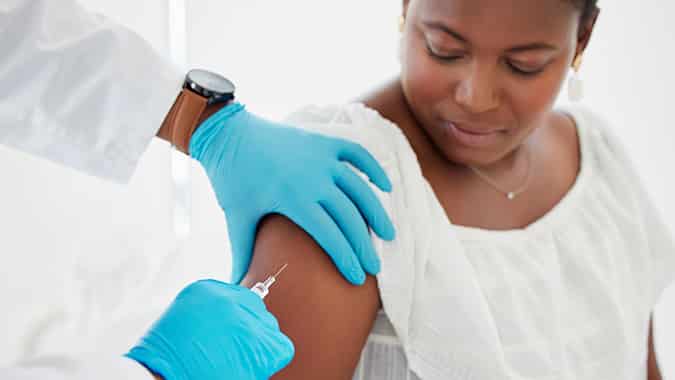Pfizer Inc. and BioNTech SE Monday announced the start of a global (except for China) Phase 2/3 safety and efficacy clinical study to evaluate a single nucleoside-modified messenger RNA (modRNA) candidate from their BNT162 mRNA-based vaccine program against SARS-CoV-2.
After extensive review of preclinical and clinical data from Phase 1/2 clinical trials, and in consultation with the U.S. Food and Drug Administration’s Center for Biologics Evaluation and Research (CBER) and other global regulators, Pfizer and BioNTech have chosen to advance their BNT162b2 vaccine candidate into the Phase 2/3 study, at a 30 µg dose level in a 2 dose regimen. BNT162b2, which recently received U.S. Food and Drug Administration (FDA) Fast Track 2 designation, encodes an optimized SARS-CoV-2 full length spike glycoprotein (S), which is the target of virus neutralizing antibodies.
“Our selection of the BNT162b2 vaccine candidate and its advancement into a Phase 2/3 study are the culmination of an extensive, collaborative and unprecedented R&D program involving Pfizer, BioNTech, clinical investigators, and study participants with a singular focus of developing a safe and effective COVID-19 RNA vaccine. The Phase 2/3 study protocol follows all the U.S. Food and Drug Administration (FDA) guidance on clinical trial design for COVID-19 vaccine studies,” said Kathrin U. Jansen, Ph.D., Senior Vice President and Head of Vaccine Research & Development, Pfizer. “The initiation of the Phase 2/3 trial is a major step forward in our progress toward providing a potential vaccine to help fight the ongoing COVID-19 pandemic, and we look forward to generating additional data as the program progresses.”
“Today, we are starting our late-stage global study, which will include up to 30,000 participants. We selected BNT162b2 as our lead candidate for this Phase 2/3 trial upon diligent evaluation of the totality of the data generated so far. This decision reflects our primary goal to bring a well-tolerated, highly effective vaccine to the market as quickly as possible, while we will continue to evaluate our other vaccine candidates as part of a differentiated COVID-19 vaccine portfolio,” said Ugur Sahin, M.D., CEO and Co-Founder of BioNTech. “Many steps have been taken towards this important milestone and we would like to thank all those involved for their extraordinary commitment.”
About the BNT162b2 Candidate
During preclinical and clinical studies of four BNT162 RNA vaccine candidates, BNT162b1 and BNT162b2 emerged as strong candidates based on assessments of safety and immune response. Pfizer and BioNTech selected BNT162b2 as the candidate to progress to a Phase 2/3 study based on the totality of available data from our preclinical and clinical studies, including select immune response and tolerability parameters. In the preclinical studies, BNT162b1 and BNT162b2 candidates induced favorable viral antigen specific CD4+ and CD8+T cell responses, high levels of neutralizing antibody in various animal species, and beneficial protective effects in a primate SARS-CoV-2 challenge model. Preliminary clinical Phase 1/2 data from nearly 120 patients demonstrated a favorable overall tolerability profile for BNT162b2, as compared to BNT162b1, with generally mild to moderate and transient (1-2 days) systemic events, such as fever, fatigue and chills and no serious adverse 3 events. Two 30 µg doses of BNT162b2 elicited neutralizing geometric mean titers (GMTs) generally similar to the GMTs that were elicited by the BNT162b1 vaccine candidate, as reflected in data the companies have previously posted on a preprint server. In older adults (65-85 years of age), two 30 µg doses, spaced three weeks apart, elicited a neutralizing antibody GMT higher than the GMT in a panel of 38 sera from subjects who had contracted SARS-CoV-2. BNT162b2 vaccinated human participants displayed a favorable breadth of epitopes recognized in T cell responses specific to the SARS-CoV-2 antigen, as compared to the BNT162b1 candidate. BNT162b2 demonstrated concurrent induction of high magnitude CD4+ and CD8+ T cell responses. BNT162b2 elicited T cell responses against the receptor binding domain (RBD) and against the remainder of the spike glycoprotein that is not contained in the BNT162b1 vaccine candidate. The companies believe that immune recognition of more spike T cell epitopes may have the potential to generate more consistent responses across diverse populations and in older adults.
The companies are continuing to collect data from the Phase 1/2 trials for all four vaccine candidates and expect to submit data on BNT162b2 for peer review and potential publication in the near future. In keeping with their commitment to transparency, the companies intend to also post the manuscript on a preprint server at that time.
About the Phase 2/3 Study
Pfizer and BioNTech finalized the Phase 2/3 study protocol in response to feedback from global regulators, including the FDA and the German Paul-Ehrlich-Institut. The Phase 2/3 study is an event driven trial that is planned to enroll up to 30,000 participants between 18 and 85 years of age. The companies plan to enroll a diverse population, including participants in areas where there is significant expected SARS-CoV-2 transmission.
The Phase 2/3 trial is designed as a 1:1 vaccine candidate to placebo, randomized, observerblinded study to obtain safety, immune response, and efficacy data needed for regulatory review. The trial’s primary endpoints will be prevention of COVID-19 in those who have not been infected by SARS-CoV-2 prior to immunization, and prevention of COVID-19 regardless of whether participants have previously been infected by SARS-CoV-2. Secondary endpoints include prevention of severe COVID-19 in those groups. The study also will explore prevention of infection by SARS-CoV-2, the virus that causes COVID-19. The primary efficacy analysis will be an eventdriven analysis based on the number of participants with symptomatic COVID-19 disease. The trial 4 design allows for interim analyses and unblinded reviews by an independent external Data Monitoring Committee.
By the end of the trial, the Phase 2/3 study is expected to be active at approximately 120 clinical investigational sites around the world, including 39 states across the United States and countries including Argentina, Brazil, and Germany. Investigator sites are selected based on factors including scientific expertise and capabilities, the epidemiology of the disease, and prior experience conducting clinical trials. For further information about this trial, visit ClinicalTrials.gov using the number NCT04368728.
Pfizer and BioNTech are committed to decreasing health disparities in underrepresented populations through the clinical trial process. To that end, many investigator sites are in diverse communities that have been disproportionately affected by COVID-19 so that individuals who have been most impacted have the opportunity to participate. The companies are also working together with investigator sites and advocacy partners to raise awareness about the importance of participation in this trial.
BNT162b2 remains under clinical study and is not currently approved for distribution anywhere in the world. If the Phase 2/3 trial is successful, Pfizer and BioNTech expect to be ready to seek Emergency Use Authorization or some form of regulatory approval as early as October 2020. If authorization or approval is obtained, the companies currently aim to supply globally up to 100 million doses by the end of 2020 and approximately 1.3 billion doses by the end of 2021.



